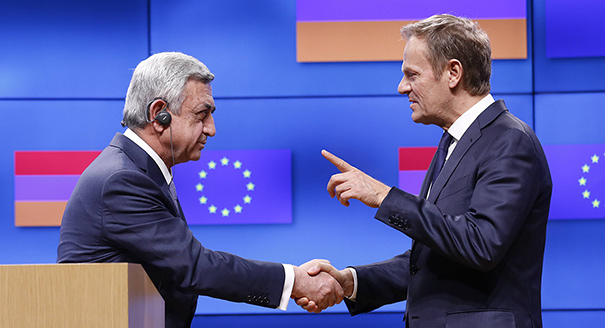The recent armed seizure of a police station in the Armenian capital, Yerevan, is just the tip of an iceberg that conceals a complex cluster of domestic and external problems. Otherwise, this episode would have remained an isolated event and would not have stirred up a wave of protests.
The armed operation on July 17 tragically cost the life of one policeman killed by the gunmen. They held other policemen hostage, before gradually releasing them. The attackers stated that they represented the Sasna Tsrer (Daredevils of Sassoun) movement. They demanded the resignation of President Serzh Sargsyan and the release from prison of Jirair (Jiro) Sefilian, a famous Armenian veteran of the Karabakh conflict and a radical opposition leader.
Sefilian became a well-known figure in Armenian politics. He was last arrested one month before the start of the current unrest. In 2012, he co-founded the Pre-Parliament movement (also known as Founding Parliament), which called for regime change and a complete restructuring of Armenian statehood. Thanks to his controversial speeches, protest rallies, and frequent arrests, although Sefilian did not enjoy mass popular support, some segments of the population considered him a symbol of disobedience and consistent opposition to the authorities.
Armenian sociopolitical life can hardly be considered stable over the last few years. There has been a series of protests, all organized by opposition groups that are not represented in the national parliament. The protestors don’t really express support for specific leaders or hostage-takers but rather voice their discontent with the current government.
Last year, mass protests against increases in electricity rates, which came to be known as “Electric Yerevan,” took place in almost every large city in Armenia. In October 2013–November 2014, the country was gripped by protests against compulsory pension contributions. Several civic initiatives—“I Oppose!,” “No to Robbery!,” and others—emerged at that time.
Armenians are used to active public protests. Around one-third of Armenia’s population of only three million people took to the streets in the late 1980s in support of union between Armenia and Nagorny Karabakh. Almost every presidential election has been accompanied by public rallies. In 2008, these demonstrations ended in violence.
On the whole, Armenia’s post-Soviet leaders have managed to successfully overcome these protests, using methods that range from co-opting opposition leaders and partial concessions to the protestors to outright political persecution. After all these years, Armenia has failed to create a process of civilized regime change and elite rotation.
In response to this, Armenian society has started to idealize the concept of change. Changing the existing political order has become an end in itself, and no one bothers to think about the cost. Those who consider themselves Pre-Parliament supporters or the Daredevils of Sassoun have not shown that they are ready to tackle economic, social, and foreign policy challenges.
The situation is different today because of several new factors. The first is generation change. The generation born right before or already after the Soviet collapse is entering active public life. They have known no other reality but national independence. Their demands are generally more extreme than those of their predecessors, and their representation in government is minimal, to put it mildly. One may say that their vision of the future is vague and hazy, but it will become more influential with each passing year.
Yet Armenia’s political elite is still dominated by Soviet-era politicians and focused on maintaining complex bureaucratic equilibriums rather than development. The existing parties and politicians don’t produce detailed political programs or charismatic leaders.
All this fosters radical views, including violence and terrorism, which can be extremely dangerous for the very existence of Armenia as a state. This statement is in no way an exaggeration in the context of the unresolved Karabakh conflict and the country’s isolation, with two out of its four international borders closed.
Karabakh also has a role in the protests in Yerevan in that opposition critics believe that the Armenian authorities did not react strongly enough to Azerbaijan. That explains why Karabakh veterans took part in the seizure of the police station.
Moreover, many Armenian politicians and public figures are unhappy with the way Russia, which is officially Armenia’s biggest ally, performs a balancing act between Baku and Yerevan. This discontent might have remained dormant for a while were it not for the violent flare-up of the Karabakh conflict in April, in which Azerbaijan used weapons acquired from Russia. The younger generation, which did not live in the Soviet Union, has an especially negative view of Russia.
As a result, Armenian public protests are also characterized by harsh criticism of Russia, and the government can no longer rely on the past model of Russian-Armenian relations, which have been called the “diplomacy of toasting,” in which each side raises a glass to the other’s achievements. It is true that Russia plays an active role in the resolution of the Karabakh conflict and that NATO does not offer Armenians a realistic alternative, but Russia’s policy toward Armenia definitely does need to change.
Russia needs to abandon its unilateral focus on Armenia’s ruling elite and to shift the projection of its soft power from messages of pro-Soviet nostalgia to concentrating on the day-to-day problems faced by active segments of the Armenian population. A scenario of political stagnation may lead to the “Ukrainization” of Armenian politics, which is especially dangerous in light of the unresolved Karabakh conflict and its potential to explode again.
The Karabakh conflict also acts as a deterrent to political turmoil in Armenia as the country’s political forces, including even the radical nationalists, fear that internal strife could play into the hands of Azerbaijan and undermine Armenian statehood. However, the Armenian elite cannot take advantage of this factor forever. Sooner or later, the country will have to resolve its domestic political problems.
